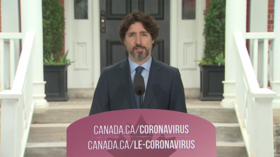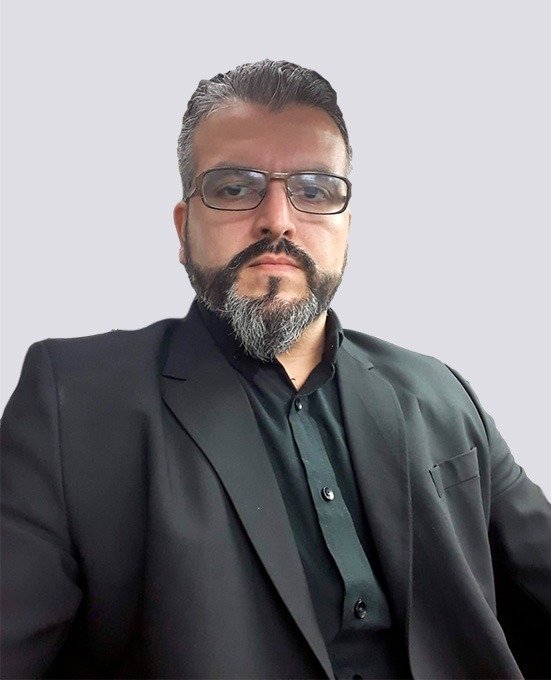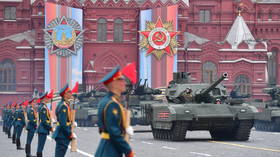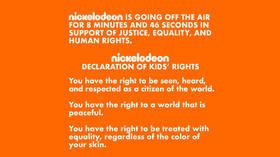Trudeau’s embarrassing 21 seconds of silence when asked about Trump’s response to riots highlights Canada’s hypocrisy

There are moments when an entire nation can feel a sense of collective awkwardness, if not embarrassment. That very thing happened in Canada and lasted for 21 excruciating seconds.
During a press conference on Tuesday, Prime Minister Justin Trudeau stood stiff and stoic, struggling to answer a reporter’s question about Canada’s response to US President Donald Trump’s threats to send in the military to deal with the anti-police-brutality protests that have erupted all over America.
It was only a few painfully audible mouth clicks that let viewers know it was Trudeau who had frozen, and not their internet. The PM broke the pause by mouthing a few predictable platitudes about how Canadians were watching the chaos unfolding in the US “with horror”, but failed to condemn the brutal crackdown by the police or Trump’s calls to use the military against his own population.
The entire incident was cringeworthy, not least because it laid bare the hypocrisy of Canada’s leadership when it comes to human rights or democracy. In this hemisphere alone, Trudeau’s government has shown remarkable double standards on these matters.
Asked about Trump's handling of the protests, Trudeau pauses for 22 sec (!!) before offering meaningless platitudes; no condemnation or even criticism.Had it been a non-Western country, there would've been no pause followed by a strong condemnation and probably some sanctions. https://t.co/6YSVs2Hmf7
— Trita Parsi (@tparsi) June 2, 2020
Canada has been among the most active countries pushing for regime change in Venezuela, often citing alleged abuses by security forces in dealing with protests, and calling into question whether there is democratic rule in the South American nation. Ottawa has never missed an opportunity to attack Nicolas Maduro’s government, even doubling down on its backing of opposition lawmaker Juan Guaido in the wake of an attempted invasion – during a pandemic, no less – by mercenaries he was allegedly connected to.
At the same time, the Canadian leader kept mum when protesters in Chile were having their eyes shot out by riot police, and Bolivians were being mowed down by military forces following orders of a coup government.
While touting its supposed principles, objectivity and moral authority, the Canadian government under Trudeau has routinely been selective in its outrage over human rights, especially when it concerns the record and interests of its allies. This is particularly true when it comes to the United States.
Unlike his father, Pierre, who often distanced his government from the actions of its neighbor to the south, Justin’s government has marched in step with US policy, and has also shown its willingness to comply with Washington’s impositions, as evidenced by the arrest and possible extradition of Huawei’s Meng Wanzhou.
Of late, the Canadian government has also been desperately trying to get a seat on the UN Security Council, which may have factored into Trudeau’s anguishing over what words would appeal to his voter base while not alienating the temperamental leader in Washington. But even before the killing of George Floyd by a white Minneapolis police set off the riots, Canada’s own record of dealing with protesters and racism – especially when it comes to indigenous people – was part of the debate about Canada’s standing on the world stage.
No way that @JustinTrudeau deserves seat @UN Security Council when Canada guilty of #genocide of Indigenous women n girls #MMIWG n allowed @RCMP to invade homes of #Wetsuweten in breach of #humanrights#Indigenousrights#UNDRIP laws that say no forced removals. #canadaisanoutlaw
— Pam Palmater (@Pam_Palmater) February 11, 2020
After all, it was the Trudeau government that sent militarized police to deal with indigenous protests over pipelines in British Columbia, after specifically condemning similar actions by its predecessors. It’s also in Canada where black and indigenous people make up a disproportionate number of those killed by police, as well as those in the country’s jails.
Canada may not be the same as the United States, but it’s not beyond reproach, either and it’s certainly no idyll. Perhaps it should pause, as Trudeau did, and reflect on how its elected leaders opportunistically use human rights, weaponizing them against those they call enemies, and glossing over them when it involves their own house or their allies.
Like this story? Share it with a friend!
The statements, views and opinions expressed in this column are solely those of the author and do not necessarily represent those of RT.















